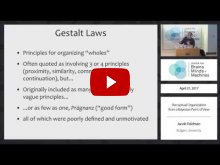 April 21, 2017 - 4:00 pm to 5:00 pm
April 21, 2017 - 4:00 pm to 5:00 pm Jacob Feldman (Rutgers)
Title: Perceptual Organization From a Bayesian Point of View
Abstract: Perceptual organization is the process by which the visual system groups the visual image into distinct clusters or units. In this talk I'll sketch a Bayesian approach to grouping, formulating it as an inverse inference problem in which the goal it to estimate the organization that best explains the observed configuration of visual elements. We frame the problem as an instance of mixture estimation, in which the image configuration is assumed to have been generated by a set of distinct data-generating components or sources (``objects''), whose structure, locations, and number we seek to estimate. I'll show how the approach works in a variety of classic problems of perceptual organization, including clustering, contour integration, figure/ground estimation, shape representation, part decomposition, object detection, and shape similarity. Because the Bayesian framework unifies a diverse array of grouping rules under a single principle, namely maximization of the Bayesian posterior---or, equivalently, minimization of descriptive complexity---I'll argue that it provides a useful formalization of the somewhat vague Gestalt notion of Prägnanz (simplicity or "good form").
Joint work with Manish Singh, Erica Briscoe, Vicky Froyen, John Wilder and Seha Kim.
Details
43 Vassar St. Bldg. 46 Cambride, MA 02139

